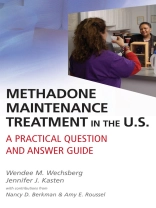The abuse of heroin and other opiates is a serious and growing public health problem. According to the 2004 National Survey on Drug Use and Health, an estimated 166, 000 Americans use heroin. In addition, 4.4 million use opiate pain relievers (including Vicodin, Percodan, Percocet, and Oxy Contin) without a prescription. Abuse of legal pain relievers represents a growing category: in 2004, approximately 2.4 million Americans abused prescription pain relievers for the first time. In total, about 1.9% of Americans are abusing illegal or legal opiates. Furthermore, opiate dependence is increasing worldwide, and significantly exacerbating the HIV/AIDS pandemic.
Methadone maintenance treatment (MMT) has been the primary form of treatment for opiate dependence in the U.S. for over 40 years. It involves providing drug abusers with a less addictive opiate (methadone) in a clinical setting, and then gradually tapering the methadone dosage. While on methadone, patients receive counseling and other medical treatments (i.e. hepatitis screening) as needed. The ability to provide all of these treatments in one location has made MMT the most effective treatment for opiate dependence to date. In the United States alone, there are more than 1, 200 MMT programs, with an estimated staff of 20, 000, serving more than 200, 000 patients annually yet, to date, there has been no comprehensive, user-friendly professional reference book on these programs.
This book fills the gap. It is written for a diverse audience, including clinicians, program administrators, substance abuse treatment researchers, and other health service professionals who want to learn about all aspects of MMT. Policy makers interested in establishing new programs, domestically and internationally, will find the information useful. The book offers insights into the effectiveness of methadone, and the characteristics of successful methadone treatment programs (budgets, services, staff, etc.), as well as regulation and accreditation issues. The information presented is based on a study of nearly 150 MMT programs in 15 states.
About RTI International
RTI International is dedicated to conducting research and development that improves the human condition by turning knowledge into practice. With a staff of more than 2, 500, RTI offers innovative research and technical solutions to governments and businesses worldwide in the areas of heatlh and pharmaceuticals, education and training, surveys and statistics, demographic governance, economic and social development, advanced technology, energy, and the environment.
The second largest independent nonprofit research organization in the United States, RTI maintains nine offices in the U.S., five internationally, and one international subsidiary, as well as project offices around the world.This book fills the gap. It is written for a diverse audience, including clinicians, program administrators, substance abuse treatment researchers, and other health service professionals who want to learn about all aspects of MMT. Policy makers interested in establishing new programs, domestically and internationally, will find the information useful. The book offers insights into the effectiveness of methadone, and the characteristics of successful methadone treatment programs (budgets, services, staff, etc.), as well as regulation and accreditation issues. The information presented is based on a study of nearly 150 MMT programs in 15 states.
Tabela de Conteúdo
Preface
Acknowledgments
List of Acronyms and and Abbreviations
Glossary
Appendix A: Opiates and Opioids
References
Index
Sobre o autor
Jennifer Kasten, Ph D, is a senior health policy analyst in the Substance Abuse Treatment Evaluations and Interventions Research Program at RTI International.












